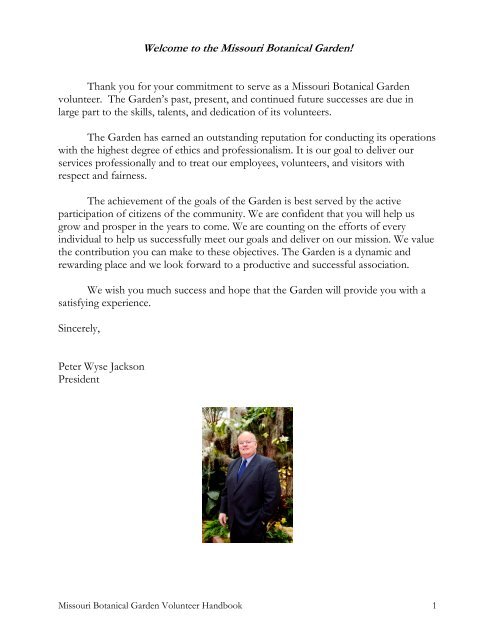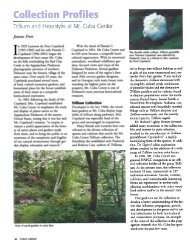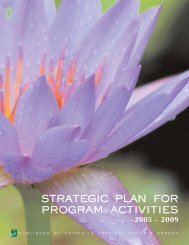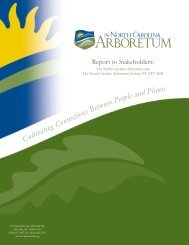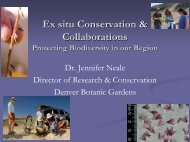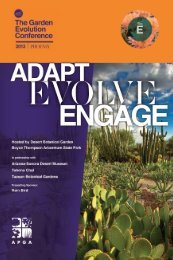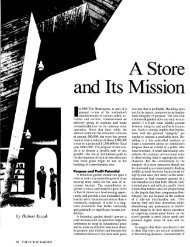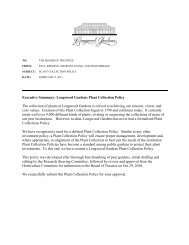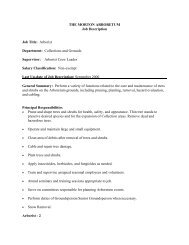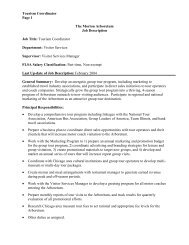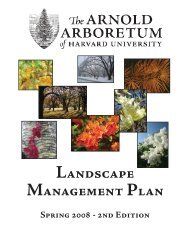Missouri Botanical Garden - American Public Gardens Association
Missouri Botanical Garden - American Public Gardens Association
Missouri Botanical Garden - American Public Gardens Association
Create successful ePaper yourself
Turn your PDF publications into a flip-book with our unique Google optimized e-Paper software.
Welcome to the <strong>Missouri</strong> <strong>Botanical</strong> <strong>Garden</strong>!<br />
Thank you for your commitment to serve as a <strong>Missouri</strong> <strong>Botanical</strong> <strong>Garden</strong><br />
volunteer. The <strong>Garden</strong>’s past, present, and continued future successes are due in<br />
large part to the skills, talents, and dedication of its volunteers.<br />
The <strong>Garden</strong> has earned an outstanding reputation for conducting its operations<br />
with the highest degree of ethics and professionalism. It is our goal to deliver our<br />
services professionally and to treat our employees, volunteers, and visitors with<br />
respect and fairness.<br />
The achievement of the goals of the <strong>Garden</strong> is best served by the active<br />
participation of citizens of the community. We are confident that you will help us<br />
grow and prosper in the years to come. We are counting on the efforts of every<br />
individual to help us successfully meet our goals and deliver on our mission. We value<br />
the contribution you can make to these objectives. The <strong>Garden</strong> is a dynamic and<br />
rewarding place and we look forward to a productive and successful association.<br />
We wish you much success and hope that the <strong>Garden</strong> will provide you with a<br />
satisfying experience.<br />
Sincerely,<br />
Peter Wyse Jackson<br />
President<br />
<strong>Missouri</strong> <strong>Botanical</strong> <strong>Garden</strong> Volunteer Handbook 1
Thank you for volunteering with the <strong>Missouri</strong> <strong>Botanical</strong> <strong>Garden</strong>!<br />
It is with great pleasure that we welcome you to the <strong>Missouri</strong> <strong>Botanical</strong><br />
<strong>Garden</strong>’s community of volunteers. The <strong>Garden</strong> recognizes the importance of<br />
volunteers and we are delighted that you have chosen to spend your valuable time at<br />
the <strong>Garden</strong>. It is not an exaggeration to say that we could not accomplish what we do<br />
without your valuable contribution.<br />
This handbook is designed to introduce you to the <strong>Garden</strong> and its associated<br />
sites* (also referenced as the “<strong>Garden</strong>”) and to provide a basic overview of the<br />
policies and procedures which give you guidance and direction. It is not to be<br />
construed as a contract or other legal document. We will share with you a little of our<br />
history, philosophy, practices, and policies, as well as the “perks” the <strong>Garden</strong> will<br />
provide to you as a valued volunteer.<br />
No volunteer handbook can anticipate every circumstance or question that may<br />
arise. If you have any questions about your volunteer experience, you are encouraged<br />
to discuss them with your Volunteer Supervisor and/or contact someone in the<br />
Volunteer Program Office. We believe you will enjoy your volunteer assignment,<br />
<strong>Garden</strong> staff, and your fellow volunteers. We also believe you will find the <strong>Garden</strong> a<br />
good place to volunteer and are confident that your association with the <strong>Garden</strong> will<br />
be challenging and rewarding.<br />
The <strong>Garden</strong> is committed to an excellent work environment. We appreciate<br />
that our volunteers’ commitment to excellence matches our own. In that spirit, we<br />
extend our sincere thanks for all you do to make the <strong>Missouri</strong> <strong>Botanical</strong> <strong>Garden</strong> a<br />
wonderful place for visitors, volunteers, and staff.<br />
Thank you!<br />
Jackie J. Juras<br />
Norma Fraser<br />
Manager, Volunteer Program<br />
Volunteer Program Associate<br />
(314) 577-5187 (314) 577-0278<br />
jackie.juras@mobot.org<br />
norma.fraser@mobot.org<br />
*Sophia M. Sachs Butterfly House, Shaw Nature Reserve, and all affiliate<br />
organizations.<br />
<strong>Missouri</strong> <strong>Botanical</strong> <strong>Garden</strong> Volunteer Handbook 2
<strong>Missouri</strong> <strong>Botanical</strong> <strong>Garden</strong> Mission<br />
The mission of the <strong>Missouri</strong> <strong>Botanical</strong> <strong>Garden</strong> is to discover and share knowledge<br />
about plants and their environment in order to preserve and enrich life.<br />
Vision<br />
The <strong>Missouri</strong> <strong>Botanical</strong> <strong>Garden</strong> is a global leader in plant science and conservation, an<br />
innovative cultural attraction that engages diverse audiences in learning about plans as<br />
the foundation of life, and an exemplary practitioner of sustainability. We conduct our<br />
own business in keeping with principles of sustainability, including conservation and<br />
restoration of natural communities, and the responsible use of natural resources, and<br />
strive to inspire others to act accordingly. We promote practices that will lead to<br />
sustainability around the world because this is the only proper course for the human<br />
race – the only one that makes sense in attempting to build a sound, healthy, diverse,<br />
and beautiful world for ourselves and for the future.<br />
Values<br />
These core values guide our daily work:<br />
• Stewardship – Demonstrating environmental stewardship, a strong conservation<br />
ethic, and sustainable practices.<br />
• Leadership – Anticipating the future and being “ahead of the curve” in botanical<br />
research, conservation and sustainability, education, horticulture and visitor<br />
engagement.<br />
• Honesty – Upholding accuracy and objectivity in all our endeavors and<br />
presentations.<br />
• Collaboration – Working with partners and alliances to speed our common goals<br />
and increase the impact of our work.<br />
• Diversity – Actively engaging people of all ages, races, nationalities, and abilities<br />
with enriching experiences at all our sites and on the Web.<br />
• Staff Development – Fostering a workplace that supports, engages, and educates a<br />
talented and diverse staff and volunteer corps.<br />
• Integrity – Standing for excellence, ethical conduct, sound management, and fiscal<br />
responsibility.<br />
• Quality of Life – Promoting the quality of life throughout the St. Louis region.<br />
• Good Neighbor – Supporting the improvement and sustainability of the<br />
neighborhoods surrounding our sites.<br />
• Accountability – Being reliable stewards of the gifts that we receive.<br />
<strong>Missouri</strong> <strong>Botanical</strong> <strong>Garden</strong> Volunteer Handbook 3
Volunteer Program Mission<br />
The mission of the <strong>Garden</strong>’s Volunteer Program is to optimize the utilization and<br />
management of the services of concerned citizens who choose to contribute their<br />
talents and skills to complement, supplement and enhance the work of paid staff in<br />
order to accomplish the <strong>Garden</strong>’s overall mission.<br />
Goals<br />
• To recruit and retain a diverse volunteer community who will complement,<br />
supplement, and enhance the work of staff.<br />
• To work with staff to determine the needs for volunteer placement and to design<br />
volunteer assignments which will meet the existing, as well as the changing,<br />
programs of the <strong>Garden</strong>.<br />
• To help create and promote a community-wide understanding of the <strong>Garden</strong> and<br />
all its programs.<br />
• To meet the community’s needs for service by addressing the citizens’ needs to<br />
serve through programs with responsibility and challenge for those qualified, and<br />
through career exploration and personal growth where this will serve the<br />
requirements of the <strong>Garden</strong>.<br />
• To expand the service of volunteers, deepen their knowledge of mission goals, and<br />
utilize their service for more effective support of key initiatives.<br />
<strong>Missouri</strong> <strong>Botanical</strong> <strong>Garden</strong> Volunteer Handbook 4
About the <strong>Missouri</strong> <strong>Botanical</strong> <strong>Garden</strong><br />
The <strong>Missouri</strong> <strong>Botanical</strong> <strong>Garden</strong> was founded<br />
by Henry Shaw in 1859 and today is the nation’s<br />
oldest botanical garden in continuous operation and<br />
a National Historic Landmark. Henry Shaw, by will<br />
upon his death, left the <strong>Garden</strong> in trust to a group<br />
of St. Louis citizens and their successors, to be<br />
maintained “for all time” for the public benefit.<br />
Thus to this day, the <strong>Garden</strong> remains a <strong>Missouri</strong><br />
charitable trust operated by a board of trustees on a<br />
fiduciary basis pursuant to the Shaw will.<br />
Shaw, a native of Sheffield, England, was born in 1800. Sheffield was an<br />
industrial iron works center at the time and was the source of employment for his<br />
father. In 1818 both he and his father arrived in North America on business.<br />
Determined to find his own fortune, Shaw left his father and arrived in the frontier<br />
town of St. Louis in 1819. Establishing a general store, Shaw sold goods and cutlery<br />
imported from his native city and over the course of the next two decades amassed a<br />
fortune for his time of $250,000. In 1840 he retired from the general goods business<br />
and began the first of his travels touring Europe.<br />
During the ensuing years he invested in real estate and purchased 760 acres<br />
four miles southwest of town in what was then known as the Prairie des Noyers<br />
Commons and purchased rental properties in the St. Louis business district. He built<br />
two lovely homes, one at Seventh and Locust in the city, and the other, which would<br />
become known as Tower Grove House, on his country estate.<br />
In 1851 on his last trip abroad, Shaw witnessed the Great Crystal Palace<br />
Exhibition and visited the Royal Botanic <strong>Garden</strong>s at Kew, but a visit to Chatsworth,<br />
the <strong>Garden</strong> of the Duke of Devonshire in the Midlands of England, would<br />
profoundly shape his future plans. While there, he conceived the idea of building a<br />
botanical garden in his adopted hometown of St. Louis and upon his return began<br />
taking steps to turn his private estate into a public garden. With the guidance of Sr.<br />
William Jackson Hooker, Director of Kew; Asa Gray, Harvard professor and<br />
preeminent botanist; and Dr. George Engelmann, St. Louis physician and nationally<br />
respected local botanist, he gradually developed the <strong>Missouri</strong> <strong>Botanical</strong> <strong>Garden</strong> not<br />
only as a display garden but as an outstanding botanical research institution including<br />
a library and herbarium.<br />
<strong>Missouri</strong> <strong>Botanical</strong> <strong>Garden</strong> Volunteer Handbook 5
In March of 1859, the <strong>Missouri</strong> legislature passed an act allowing Shaw to grant<br />
760 acres of property located in the Prairie des Noyers Commons to trustees for the<br />
purpose of developing and maintaining a botanical garden, and on June 15, 1859, the<br />
<strong>Missouri</strong> <strong>Botanical</strong> <strong>Garden</strong> opened to the public. Shaw would later offer his second<br />
gift to St. Louis in 1868 with the establishment of Tower Grove Park. He devoted the<br />
remainder of his life to these properties, developing the grounds, planting thousands<br />
of trees, building greenhouses, pergolas, pagodas, observatories, commissioned<br />
statues, and in the park, highlighted his love for music by erecting a bandstand<br />
surrounded by the busts of famous composers. In 1885, he established the Henry<br />
Shaw School of Botany at Washington University furthering his commitment to the<br />
study of plants.<br />
In his personal life Shaw never married and remained a lifelong bachelor even<br />
though family members would continually play would-be matchmakers. Prior to his<br />
death Shaw drew up a new will to provide for the <strong>Garden</strong> after he had gone. He died<br />
August 25, 1889, and is buried in his mausoleum upon the <strong>Garden</strong> grounds he so<br />
loved.<br />
For more than 150 years, the <strong>Garden</strong> has been an oasis in the city of St. Louis,<br />
a place of beauty and family fun, and also a center for education, science, and<br />
conservation. Today the <strong>Garden</strong>, with an eye to the past, looks to the promise of our<br />
future, and a legacy of which Henry Shaw would surely be proud.<br />
<strong>Missouri</strong> <strong>Botanical</strong> <strong>Garden</strong> Volunteer Handbook 6
About Shaw Nature Reserve<br />
Shaw Nature Reserve, on the Meramec River and about six miles south of the<br />
<strong>Missouri</strong> River is in the region known as the Ozark Border. This region encompasses<br />
some 13 percent of the state of <strong>Missouri</strong> and divides the rolling prairie lands of<br />
northern <strong>Missouri</strong> that were formed by glaciers, from the Ozark Plateau, that was<br />
formed by uplift and erosion. The Reserve is near the junction of Highway 100 and<br />
Interstate 44 in northeastern Franklin County.<br />
<strong>Missouri</strong> is known for its rich and beautiful collection of natural habitats as well<br />
as for its complex and diverse geology. Since Shaw Nature Reserve sits at the juncture<br />
of several of these major Midwestern habitats, the diversity of both plant and animal<br />
life is great. This natural diversity provides an exceptional outdoor classroom for<br />
scholars and students as well as casual observers.<br />
At the Reserve, the replicated prairie evokes images of buffalo and Native<br />
<strong>American</strong>s as breezes ripple the sea of native grasses and forbs. Each spring,<br />
abundant woodlands burst forth with a multitude of native wildflowers while, later in<br />
the year, the same woodlands offer lush green shade, oases from the summer sun.<br />
Wetlands, known for their splendid array of species, offer a close-up look at<br />
aquatic plant and animal life. Visitors to this special environment include great blue<br />
and little green herons, dragonflies and other fascinating creatures. The slopes, which<br />
are the watershed of the wetlands, are cloaked in flowery reconstructed prairie.<br />
The many trails offer easy strolls and hikes that bring visitors in close contact<br />
with these habitats. One can explore for an hour or a day—the variety of trails offer<br />
many choices. Benches along the way provide resting spots for quiet meditation and<br />
observation of birds, butterflies and other wildlife as well as the seasonal parade of<br />
both flowering and non-flowering plants.<br />
<strong>Missouri</strong> <strong>Botanical</strong> <strong>Garden</strong> Volunteer Handbook 7
St. Louis is one of very few metropolitan regions that can boast of a 2,441-acre<br />
natural asset such as Shaw Nature Reserve so near its city-based parent organization,<br />
the world-famous <strong>Missouri</strong> <strong>Botanical</strong> <strong>Garden</strong>. This proximity allows easy access for<br />
children and adults alike to not only experience the natural beauty of our region but<br />
also to learn sound environmental stewardship through the Reserve’s numerous<br />
educational programs.<br />
The <strong>Missouri</strong> <strong>Botanical</strong> <strong>Garden</strong>’s land purchase in 1925 began the legacy of<br />
Shaw Nature Reserve. Originally set up as a safe refuge for the plant collection from<br />
the smoke pollution of the 1920’s, its role in the community has evolved through the<br />
years. Shaw Nature Reserve has many roles—as a nature reserve, a place to walk and<br />
hike, and a good spot for relaxing and for studying nature. It has become a premier<br />
educational, research and habitat restoration and reconstruction site.<br />
Over the years, tens of thousands of school children and adults have learned<br />
more about nature and the environment by observation and through the guidance of<br />
Shaw Nature Reserve’s educational and professional staff. Teachers themselves come<br />
to improve their teaching of ecological principles as well as to gain a greater<br />
appreciation of the natural world. In recognition of its worth as an educational<br />
resource, the Reserve was designated a National Environmental Education Landmark<br />
by the U.S. Secretary of the Interior in 1972.<br />
<strong>Missouri</strong> <strong>Botanical</strong> <strong>Garden</strong> Volunteer Handbook 8
About the Sophia M. Sachs Butterfly House<br />
The Butterfly House is a not-for-profit organization which was established in<br />
1995 to increase awareness of the natural habitat in which butterflies thrive. Officers<br />
of the corporation were: Evelyn E. Newman, Lucy Lopata, Linda Penniman, Caroline<br />
Loughlin and Charles A. Lowenhaupt. The new facility was built entirely with private<br />
funds provided through donations of foundations, corporations, individuals, as well as<br />
membership support.<br />
Ground was broken in June of 1997 and construction began on the Butterfly<br />
House. The 8,000 square foot Conservatory <strong>Garden</strong> is sheathed in 646 pieces of glass,<br />
each measuring 4' X 6' and weighing approximately 200 pounds. The center vault,<br />
soaring 36' high at its apex, is one of five vaults designed to minimize visual (and<br />
flight) obstruction. Great care was taken in the design and engineering of the building<br />
to assure a natural and safe habitat for the butterflies. An additional 8,000 square feet<br />
adjacent to the Conservatory houses a classroom, theater, visitor amenities and gift<br />
shop. Christner, Inc., Bannes Consulting and BSI Constructors executed the design,<br />
project management and construction.<br />
The Butterfly House opened its doors to the public on September 18, 1998<br />
and provides educational opportunities to a diverse visitorship. In 2000 the outdoor<br />
area known as the Butterfly <strong>Garden</strong> was dedicated. The Butterfly House offers<br />
education programs, special events, lectures and, of course, the chance to witness<br />
butterflies in two habitats, one native and one tropical.<br />
In July, 2001, the Butterfly House became a division of the <strong>Missouri</strong> <strong>Botanical</strong><br />
<strong>Garden</strong>, a leader in horticultural displays, research and education. The following year,<br />
2002, the second expansion of the facility opened and was designated the "Emerson<br />
Lakeside Terrace". This plaza area is the site for many special events, both public and<br />
private. The same year, the Butterfly House began participating with Butterfly<br />
Conservation Initiative, BFCI, of the <strong>Association</strong> of Zoos and Aquariums and the<br />
next year it was accredited by the AZA becoming the only dedicated insect facility in<br />
this organization.<br />
<strong>Missouri</strong> <strong>Botanical</strong> <strong>Garden</strong> Volunteer Handbook 9
The historic Faust Family greenhouse structure was renovated in 2007 and<br />
began supplying a significant portion of animal food needs, especially nectar for the<br />
butterflies. In 2007, the Butterfly House was also recognized by El Bosque Nuevo as<br />
providing funding, through purchases of pupae from this sustainable butterfly farming<br />
operation in Costa Rica, to purchase more than 16 acres of land for the protected<br />
reserve.<br />
<strong>Missouri</strong> <strong>Botanical</strong> <strong>Garden</strong> Volunteer Handbook 10
About Litzsinger Road Ecology Center<br />
The Litzsinger Road Ecology Center (LREC) is an<br />
established educational site with land and facilities dedicated to<br />
promoting science teaching and learning, environmental literacy,<br />
and stewardship of the Earth. While located in the heart of the<br />
St. Louis metropolitan area, just ten miles west of downtown St.<br />
Louis, this unique 34-acre study center encompasses a rich<br />
variety of habitats including bottomland forest, restored prairie,<br />
and an urban creek. In addition, classrooms and an on-site<br />
computer laboratory offer research and instructional experiences<br />
that increase the scope of learning for students and teachers.<br />
LREC, under the management of the <strong>Missouri</strong> <strong>Botanical</strong><br />
<strong>Garden</strong>, is available to educators and students for research and<br />
field science programs. It is part of the Place-Based Education<br />
Evaluation Collaborative which aims:<br />
• To serve as a learning organization for program<br />
developers, fueling internal growth and program<br />
development for the individual organizations;<br />
• To develop, identify and disseminate evaluation<br />
techniques, tools and approaches that can be applied<br />
elsewhere; and<br />
• To contribute to the research base underlying the<br />
field of place-based education and school change.<br />
<strong>Missouri</strong> <strong>Botanical</strong> <strong>Garden</strong> Volunteer Handbook 11
About the <strong>Garden</strong>’s Affiliate Organizations<br />
<strong>Botanical</strong> Society of America was formally established in 1893 as an offshoot of the<br />
<strong>Botanical</strong> Club of the <strong>American</strong> <strong>Association</strong> for the Advancement of Science. The<br />
first president of the society was William Trelease. Its mission is to promote botany,<br />
the field of basic science dealing with the study and inquiry into the form, function,<br />
development, diversity, reproduction, evolution, and uses of plants and their<br />
interactions within the biosphere. To accomplish this mission, the objectives of the<br />
Society are to sustain and provide improved formal and informal education about<br />
plants; encourage basic plant research; provide expertise, direction, and position<br />
statements concerning plants and ecosystems; and foster communication within the<br />
professional botanical community, and between botanists and the rest of humankind<br />
through publications, meetings, and committees. (http://botany.org/)<br />
Center for Plant Conservation is dedicated solely to preventing the extinction of<br />
U.S. native plants. The Center was one of the first organizations created to meet this<br />
need. The Center is a network of 37 leading botanic institutions. Founded in 1984, the<br />
Center operates the only coordinated national program of off-site conservation of rare<br />
plant material. This conservation collection ensures that material is available for<br />
restoration and recovery efforts for these species. CPC also works in research,<br />
restoration, technical assistance, education and advocacy through the efforts of the<br />
network and the national office. (http://www.centerforplantconservation.org/)<br />
EarthShare of <strong>Missouri</strong> is a federation of America’s leading non-profit environment<br />
and conservation organizations, working to promote environmental education and<br />
charitable giving through workplace giving campaigns. EarthShare is an opportunity, a<br />
system, and an answer for environmentally conscious employees and workplaces to<br />
support dozens of environmental groups at once through a charitable giving drive.<br />
Their goal is to continue expanding opportunities for working people to have an easy<br />
and effective way to help the environment, and in doing so, help ensure the<br />
preservation of our natural heritage. (http://www.earthsharemo.org/)<br />
<strong>Missouri</strong> <strong>Botanical</strong> <strong>Garden</strong> Volunteer Handbook 12
St. Louis-Jefferson Solid Waste Management District was formed in 1991 by<br />
Jefferson County, St. Louis County and the City of St. Louis. St. Charles joined the<br />
District in 2002. The District serves as a resource to assist the public, private, and notfor-profit<br />
sectors in establishing and expanding waste reduction, recycling and<br />
composting efforts in the St. Louis area. (http://swmd.net/)<br />
<strong>Missouri</strong> <strong>Botanical</strong> <strong>Garden</strong> Volunteer Handbook 13
The <strong>Garden</strong>’s Work Environment<br />
Code of Conduct and Ethics<br />
It is the policy of the <strong>Garden</strong> that every Board member, employee, and volunteer be<br />
committed, with integrity and in good faith, to fulfilling the <strong>Garden</strong>’s mission. The<br />
<strong>Garden</strong>, its employees, and its volunteers desire the public’s trust and believe that they<br />
will earn it by so acting and by being responsive to the public. In order to assist its<br />
employees and volunteers to conduct themselves and the <strong>Garden</strong>’s research,<br />
conservation, display, education, fund-raising and other business affairs in accordance<br />
with the highest ethical standards, the <strong>Garden</strong> has adopted a Code of Ethics.<br />
You are expected to read and adhere to the Code of Ethics Policy. You may obtain a<br />
copy from your volunteer supervisor or the Volunteer Program Office. By signing the<br />
Acknowledgement of Receipt of Handbook you are agreeing to read, understand, and to<br />
adhere to the policies set forth in the Code of Ethics Policy.<br />
Reporting Violations<br />
The <strong>Garden</strong> has secured the services of an independent third-party provider to<br />
receive, through www.ethicspoint.com or by calling toll-free (866) 873-0615,<br />
allegations of unethical or illegal conduct. A full investigation will be conducted in<br />
response to any report received, with recommendations concerning the appropriate<br />
corrective actions that may be taken.<br />
Equal Employment Opportunity/Affirmative Action Statement<br />
The <strong>Garden</strong> is an equal opportunity employer and is committed to the principles of<br />
equal employment opportunities for all employees as well as applicants for volunteer<br />
placement. Volunteer placement decisions at the <strong>Garden</strong> will be made without regard<br />
or consideration of an individual’s race, color, religion, sex (including pregnancy,<br />
childbirth, or related medical conditions), national origin, citizenship, age, sexual<br />
orientation, gender identify and/or expression, disability, marital status, veteran status,<br />
or any other basis prohibited by law. It is the responsibility of every volunteer to<br />
ensure that discrimination on any of these protected bases does not occur at the<br />
<strong>Garden</strong>.<br />
We believe that a diverse workforce best serves the interests of the <strong>Garden</strong>, our<br />
employees, visitors, volunteers, and community. To support our commitment, the<br />
<strong>Garden</strong> maintains an affirmative action program. Through this program, the <strong>Garden</strong><br />
monitors staff (paid and unpaid) representation, employment policies and programs,<br />
and good-faith efforts to promote the letter and spirit of the law.<br />
<strong>Missouri</strong> <strong>Botanical</strong> <strong>Garden</strong> Volunteer Handbook 14
Discrimination/Harassment<br />
The <strong>Garden</strong> is committed to providing a work environment free of discrimination<br />
and/or harassment, and one in which all individuals are treated with respect and<br />
dignity. Discrimination or harassment based on a volunteer’s race, color, religion, sex,<br />
ancestry, national origin, citizenship, age, sexual orientation, gender identity and/or<br />
expression, disability, marital status, veteran status, or any other basis prohibited by<br />
law will not be tolerated.<br />
The <strong>Garden</strong> strictly prohibits discrimination and harassment. Accordingly, the <strong>Garden</strong><br />
requires all volunteers to report immediately any incidents of such discrimination<br />
and/or harassment whether committed by another volunteer, employee, independent<br />
contractor, consultant, vendor, or visitor to the <strong>Garden</strong>. All claims of discrimination<br />
will be promptly investigated. Violation of this policy will result in disciplinary action,<br />
up to and including release from volunteer service.<br />
The <strong>Garden</strong> expects that all relationships will remain respectful and professional.<br />
Retaliation against volunteers for raising claims of discrimination or harassment will<br />
not be tolerated.<br />
Sexual Harassment<br />
Sexual harassment is defined as unwelcome sexual advances, requests for sexual<br />
favors, and other visual, verbal, or physical conduct of a sexual nature that:<br />
• is made either explicitly or implicitly a term or condition of volunteer placement or<br />
assignment;<br />
• is used as a basis for making assignment decisions affecting the volunteer; or<br />
• has the purpose or effect of substantially interfering with a volunteer’s ability to<br />
carry out his/her assignment or creates an intimidating, hostile or offensive<br />
working environment.<br />
Consistent with this policy, the <strong>Garden</strong> prohibits all activities of an express or implied<br />
sexual nature from occurring.<br />
Sexual harassment is strictly prohibited whether or not it is between members of the<br />
opposite sex or the same sex. Furthermore, sexual harassment is prohibited at<br />
<strong>Garden</strong>-sponsored events and in the context of all tasks performed on the <strong>Garden</strong>’s<br />
behalf, whether or not it takes place on property owned by the <strong>Garden</strong>.<br />
Other Forms of Harassment<br />
Discriminatory, harassing conduct may take many different forms. Harassment based<br />
on race, color, religion, sex, ancestry, national origin, citizenship, age, sexual<br />
orientation, gender identity and/or expression, disability, martial status, veteran status,<br />
or any other basis prohibited by law is a form of discrimination and will not be<br />
tolerated.<br />
<strong>Missouri</strong> <strong>Botanical</strong> <strong>Garden</strong> Volunteer Handbook 15
Reporting a Complaint<br />
If you receive a complaint or observe or believe you are a victim of discrimination or<br />
any form of harassment while performing your volunteer assignment, or at a <strong>Garden</strong>sponsored<br />
event, you should immediately report it to one of the following:<br />
• your supervisor<br />
• another division management member, or<br />
• the Volunteer Program Office.<br />
You are not required to report your concerns to anyone who is the subject of your<br />
complaint. In addition to reporting your concerns, if anyone at the <strong>Garden</strong> or at any<br />
<strong>Garden</strong>-sponsored event engages in conduct that makes you feel uncomfortable, we<br />
encourage you to tell that person that the conduct is unwelcome, that you find it<br />
offensive, and that it should stop immediately.<br />
Complaints will be kept as confidential as possible. The Volunteer Program Office<br />
will promptly investigate complaints of discrimination and/or harassment. All<br />
employees and volunteers are required to cooperate fully in any investigation.<br />
Following the investigation, if warranted, the <strong>Garden</strong> will take appropriate corrective<br />
action, up to and including termination of release from volunteer service.<br />
The <strong>Garden</strong> prohibits any form of retaliation against a volunteer for lodging a goodfaith<br />
complaint under this policy or for participating in good faith in the investigation<br />
of a claim of discrimination or harassment. Any volunteer who believes he/she has<br />
been subjected to retaliation should contact the Volunteer Program Office.<br />
Workplace Violence Prevention<br />
It is the intent of this policy to ensure that anyone associated with the <strong>Garden</strong>,<br />
including employees, volunteers, and visitors, never feels threatened by another’s<br />
actions or conduct. You should be treated with courtesy and respect at all times.<br />
Volunteers are expected to refrain from fighting, horseplay, or other conduct that may<br />
be dangerous to others. Conduct that threatens, intimidates, or coerces another<br />
volunteer, employee, or visitor will not be tolerated. The <strong>Garden</strong> is committed to<br />
providing a safe work environment and will take prompt remedial action up to and<br />
including immediate release from volunteer service against any volunteer who engages<br />
in any threatening behavior or acts of violence or who uses obscene, abusive, or<br />
threatening language or gestures.<br />
• Workplace violence includes any act or behavior that causes or threatens to cause<br />
harm, physical or otherwise, to another person or property.<br />
“Workplace” as used in this policy, means any <strong>Garden</strong>-owned or leased property<br />
including <strong>Garden</strong> vehicles and parking areas, sites of <strong>Garden</strong>-sponsored events, and<br />
any location visited while conducting <strong>Garden</strong>-related business.<br />
<strong>Missouri</strong> <strong>Botanical</strong> <strong>Garden</strong> Volunteer Handbook 16
All volunteers have a “duty to warn” their supervisors, Security Officers (on <strong>Garden</strong><br />
grounds), and the Volunteer Program Office of any suspicious workplace activity,<br />
situations, or incidents that they observe or know of that may involve other<br />
volunteers, employees, or visitors and that appear potentially dangerous or<br />
problematic. Volunteer reports made in adherence to this policy will be held in<br />
confidence, to the maximum extent possible. The <strong>Garden</strong> will not condone any form<br />
of retaliation against any volunteer for making a report in good faith under this policy.<br />
Confrontational threats, threatening conduct, or any other acts of aggression or<br />
violence in the workplace will not be tolerated. Based upon the seriousness of these<br />
reported behaviors, any volunteer determined to have committed such acts will be<br />
subject to disciplinary action, up to and including release from volunteer service.<br />
<strong>Missouri</strong> <strong>Botanical</strong> <strong>Garden</strong> Volunteer Handbook 17
Volunteer Program Operations<br />
Volunteer Perks<br />
Parking<br />
The <strong>Garden</strong> makes every effort to provide and maintain free parking that is<br />
convenient, clean, and safe. Volunteers using this parking assume the risk of property<br />
damage or theft.<br />
Admission<br />
• Free admission for yourself and up to nine guests at all of the <strong>Garden</strong><br />
locations*<br />
Discounts<br />
• 20 percent in Sassafras*<br />
• 20 percent in Terrace View Café (seasonal, operated from Kemper Center)*<br />
• 20 percent at all <strong>Garden</strong> retail shops*<br />
• Receive the member rate on adult education classes<br />
Tram Ride<br />
• Free ride for yourself*<br />
Recognition Events<br />
• All active volunteers receive an invitation to the annual Volunteer Appreciation<br />
Evening celebration.<br />
• Volunteers who celebrate benchmark years of service (e.g., 10, 20, 30, 40)<br />
receive an invitation to the Volunteer Service Recognition Luncheon<br />
Honorary Membership<br />
• Upon completion of one year of service and 50 hours, you are eligible to<br />
request an honorary membership through your supervisor or the Volunteer<br />
Program Office.<br />
* You must display your volunteer ID Badge<br />
Identification<br />
You will obtain an Identification Badge from the Volunteer Program Office.<br />
Regardless of dress or uniform attire, volunteers are required to wear their <strong>Garden</strong><br />
identification badge at all times while performing their volunteer assignments on<br />
<strong>Garden</strong> grounds. Upon separation from volunteer service, volunteers will turn in their<br />
Identification Badge to their immediate supervisor or the Volunteer Program Office.<br />
<strong>Missouri</strong> <strong>Botanical</strong> <strong>Garden</strong> Volunteer Handbook 18
Criminal Background Checks<br />
The <strong>Garden</strong> has determined whether a criminal history background check is required<br />
for each volunteer assignment based on the type of assignment, business necessity,<br />
and applicable state laws. When a criminal history background check is required, the<br />
volunteer must authorize this background investigation in writing using the <strong>Garden</strong>’s<br />
consent form. The <strong>Garden</strong> will inquire only about convictions and probation status, if<br />
any.<br />
The following factors will be considered for those with a criminal history in<br />
determining whether to place them in a volunteer assignment: the nature of the<br />
criminal conviction and its relationship to the position; the amount of time passed<br />
since the conviction; the number of convictions; and whether placing the applicant<br />
would pose an unreasonable risk to the <strong>Garden</strong>’s operations.<br />
If a volunteer attempts to withhold or falsify information pertaining to previous<br />
convictions, he/she will be disqualified from further volunteer service consideration<br />
in any area of the <strong>Garden</strong>.<br />
<strong>Missouri</strong> <strong>Botanical</strong> <strong>Garden</strong> Volunteer Handbook 19
Volunteer Responsibilities<br />
Dress and Appearance<br />
Appropriate dress and personal hygiene play an important part in promoting a<br />
positive <strong>Garden</strong> image. Notwithstanding the requirements and prohibitions of this<br />
policy, the <strong>Garden</strong> will make reasonable religious accommodations involving dress<br />
and appearance.<br />
While many divisions have a business casual dress environment or have adopted<br />
volunteer assignment-appropriate uniforms, you are expected to represent the garden<br />
in a professional manner and dress appropriately.<br />
The <strong>Garden</strong> recognizes that personal appearance is an important element of selfexpression.<br />
However, excessive jewelry and/or conspicuously displayed body<br />
piercings and tattoos do not reflect the highest standard of professionalism. The<br />
following attire is not acceptable: spandex; bare feet; pants, shorts, or skirts worn<br />
significantly below the waistline; sexually provocative clothing; hats in the business<br />
office environments; clothing featuring profanity, nude or semi-nude pictures,<br />
product advertisements, sexually suggestive slogans, cartoons, or drawings; the<br />
observable lack of or exposed undergarments.<br />
Volunteers who fail to adhere to the <strong>Garden</strong>’s dress code guidelines will be asked to<br />
initiate appropriate solutions such as removal of excess jewelry, covering tattoos, or<br />
returning home to change clothes. Please consult your supervisor if you have<br />
questions as to what constitutes proper attire in your area.<br />
Attendance<br />
The positions volunteers fill are critical to the <strong>Garden</strong>. If you are unable to report to<br />
volunteer, or if you will arrive late, please contact your supervisor or the Volunteer<br />
Program Office. Give your supervisor as much time as possible to arrange for<br />
someone else to cover your position. Excessive absences and tardiness will result in a<br />
review of your volunteer assignment or release from volunteer service.<br />
Hours Reporting<br />
It is vital that the <strong>Garden</strong> has a record of the amount of time given by volunteers.<br />
Your hours show that we have community support and are used for grants and<br />
proposals as well as for insurance purposes. Discuss the record-keeping procedure for<br />
your area with your supervisor. Normal travel time to and from the <strong>Garden</strong> is not to<br />
be recorded as creditable time.<br />
Personal Status Changes<br />
Please promptly notify the volunteer program office of any address, name, or phone<br />
number changes. Also let us know if there is a change in your emergency contact<br />
<strong>Missouri</strong> <strong>Botanical</strong> <strong>Garden</strong> Volunteer Handbook 20
information. The health and safety of our volunteers is a top priority for the<br />
Volunteer Program Office.<br />
Personal Conduct<br />
The <strong>Garden</strong> has established a standard of behavior that is required of all volunteers. It<br />
is our policy that volunteers maintain an environment that fosters mutual respect,<br />
cooperation, and teamwork, and promotes civil and congenial relationships among<br />
employees, volunteers, and visitors, and is free from all forms of<br />
harassment/discrimination and violence.<br />
Volunteers who exhibit behaviors considered unacceptable, as well as engage in any<br />
other conduct deemed unacceptable, including retaliatory acts of any kind, are subject<br />
to disciplinary action up to and including release from volunteer service with or<br />
without an opportunity for corrective action.<br />
Volunteer placement at the <strong>Garden</strong> is based on mutual consent and both the<br />
volunteer and the <strong>Garden</strong> have the right to release the volunteer from his/her<br />
assignment for any reason or no reason, with or without cause or advance notice.<br />
Personal Property<br />
Personal property is the responsibility of the volunteer. The <strong>Garden</strong> does not accept<br />
responsibility or reimburse for lost, stolen, or damaged personal property.<br />
Transfer<br />
Requests for change of assignment should be coordinated by the Volunteer Program<br />
Office. The exception to this would be moving to another position within the same<br />
division.<br />
Leave of Absence<br />
The <strong>Garden</strong> recognizes the importance of providing leave for volunteers who must be<br />
absent due to medical, family, or personal circumstances. To request a leave of<br />
absence, notify your supervisor and the Volunteer Program Office.<br />
<strong>Missouri</strong> <strong>Botanical</strong> <strong>Garden</strong> Volunteer Handbook 21
General Volunteer Policies<br />
Drug and Alcohol-Free Workplace<br />
The <strong>Garden</strong> is committed to protecting the safety, health, and well-being of everyone<br />
at the <strong>Garden</strong>. We recognize that drug and alcohol abuse can threaten these goals.<br />
Therefore, we have established a Drug and Alcohol-Free Workplace Policy to provide<br />
employees and volunteers with guidelines for handling the use of drugs, alcohol, and<br />
other controlled substances. This policy applies to all volunteers whether on or off<br />
<strong>Garden</strong> property, including parking areas, while representing or conducting business<br />
for the <strong>Garden</strong> during your volunteer shift, during <strong>Garden</strong>-sponsored events, in<br />
meetings, and while in a <strong>Garden</strong> vehicle.<br />
Prohibited Behavior<br />
It is a violation of our Drug and Alcohol-Free Workplace Policy to:<br />
• manufacture, sell, distribute, dispense, possess, use, trade, offer for sale, or offer to<br />
buy illegal drugs or otherwise engage in the illegal use of drugs on or off the<br />
volunteer assignment;<br />
• report for your volunteer assignment with illegal drugs (e.g., marijuana, cocaine,<br />
opiates, amphetamines, and phencyclidine) or other intoxicants (e.g., glue) in your<br />
system;<br />
• report for your volunteer assignment under the influence of or impaired by<br />
alcohol.<br />
Legally prescribed and over-the-counter drugs or medicines are permitted provided<br />
the medications will not impair your ability to perform your assignment safely and<br />
efficiently. Reporting to or being at your volunteer assignment while using prescribed<br />
or over-the-counter drugs where such use may prevent you from performing the<br />
duties of the assignment or present a safety hazard to you, other persons, or property<br />
is prohibited. If the use of a legally prescribed or over-the-counter medication could<br />
compromise your safety, the safety of other volunteers, employees or the public, it is<br />
your responsibility to notify your supervisor and the Volunteer Program Office for<br />
consultation, or use appropriate safety personnel procedures to avoid unsafe<br />
workplace practices.<br />
Consequences<br />
If a volunteer violates the Policy, the volunteer will be subject to disciplinary action,<br />
up to and including release from volunteer service.<br />
Confidential and Proprietary Information<br />
Throughout your volunteer service with the <strong>Garden</strong>, you may create, discover, or<br />
receive proprietary and/or confidential information. You should assume that all nonpublic<br />
or unpublished information relating to the <strong>Garden</strong> and its visitors is<br />
confidential. If there is a question of whether certain information is considered<br />
confidential, you should first check with your supervisor.<br />
<strong>Missouri</strong> <strong>Botanical</strong> <strong>Garden</strong> Volunteer Handbook 22
Media Inquiries, Interviews, Speeches and Articles<br />
The <strong>Garden</strong>’s Communications Division is responsible for dealing directly with the<br />
media which includes, but is not limited to, all news media outlets, national or local<br />
newspapers, magazines, journalists, authors, radio and television stations, and<br />
Internet-based media outlets.<br />
If you are approached or contacted by a media representative, you should immediately<br />
refer the inquiry to our Communications Division for review prior to granting an<br />
interview or releasing any information.<br />
All volunteers should be cognizant of any situation where they may be identified by<br />
their affiliation to the <strong>Garden</strong>, so as to ensure that the integrity and reputation of the<br />
institution are not compromised and to prevent all conflicts of interest. If you are<br />
unclear as to whether or not your participation with a media outlet is permissible, you<br />
should promptly contact the Communications Division to obtain approval prior to<br />
granting any external media interviews.<br />
Solicitation<br />
To assume a productive work environment, the <strong>Garden</strong> forbids oral solicitations and<br />
distributions of information/materials on our premises. Employees and volunteers are<br />
not to solicit or be solicited during their working time for any purpose. Additionally,<br />
<strong>Garden</strong> assets such as bulletin boards, email, telephones, computers, the <strong>Garden</strong><br />
intranet and handheld communication devices, copiers, stationery, and meeting rooms<br />
are not to be used for solicitation purposes. Political or other campaign buttons,<br />
clothing, etc. may not be worn or displayed by volunteers during their shifts.<br />
Smoke-Free <strong>Garden</strong><br />
The <strong>Garden</strong> maintains a smoke-free work environment for the benefit of all<br />
employees, volunteers, and visitors. Tobacco of any kind is strictly prohibited on all<br />
<strong>Garden</strong> properties or in view of <strong>Garden</strong> visitors. This includes the act of lighting,<br />
smoking, or carrying a lighted or smoldering cigar, cigarette, e-cigarette, or pipe of any<br />
kind. Violations or concerns should be brought to the attention of your supervisor or<br />
the Volunteer Program Office.<br />
Use of <strong>Garden</strong> Property<br />
The <strong>Garden</strong> provides its volunteers with the appropriate equipment needed to<br />
perform their volunteer assignments. Because this equipment is <strong>Garden</strong> property,<br />
volunteers are expected to use this equipment solely for <strong>Garden</strong> business purposes.<br />
<strong>Garden</strong> property is defined as any piece of equipment, furnishing, vehicle, building, or<br />
supply leased, owned, donated, and in the custodial care of the <strong>Garden</strong>. When using<br />
<strong>Missouri</strong> <strong>Botanical</strong> <strong>Garden</strong> Volunteer Handbook 23
<strong>Garden</strong>’s property, volunteers are expected to exercise care and follow all operating<br />
instructions, safety standards, and guidelines. Please notify your supervisor if any<br />
equipment appears to be damaged, defective, or in need of repair, and do not<br />
continue to use.<br />
Personal use of all <strong>Garden</strong> property and business equipment, including but not limited<br />
to telephone systems, computers, and copy/fax machines should be reasonable and<br />
kept to a minimum. Volunteers may not utilize personally owned computer<br />
equipment at the <strong>Garden</strong>.<br />
Volunteers who are negligent in operating, fail to adequately safeguard, or<br />
inappropriately use <strong>Garden</strong> equipment and/or property will be subject to corrective<br />
action, up to and including release from volunteer service.<br />
Children in the <strong>Garden</strong><br />
Volunteers may occasionally bring their children, provided that visits are infrequent,<br />
brief, planned in a fashion that limits disruption, and approved by their supervisor in<br />
advance. While children are at the <strong>Garden</strong>, they must be directly supervised by the<br />
volunteer at all times. The <strong>Garden</strong> should not be used in lieu of child care.<br />
Telephone and Electronic Communications System<br />
The <strong>Garden</strong> may provide volunteers with appropriate information systems access as<br />
needed in their collaboration with the <strong>Garden</strong>. No unauthorized use of computer<br />
hardware or software is permitted. You may obtain a copy of the Information Systems<br />
Acceptable Use Policy for <strong>Garden</strong> Non-Employees from your supervisor or the Volunteer<br />
Program Office. By signing the Acknowledgement of Receipt of Handbook you are agreeing<br />
to read, understand, and to adhere to the policies set forth in the Information Systems<br />
Acceptable Use Policy for <strong>Garden</strong> Non-Employees Policy.<br />
Social Media<br />
The <strong>Garden</strong>’s Facebook, Twitter, and other social media accounts offer a unique and<br />
creative way for us to participate in authentic discussions with the public. By creating<br />
and engaging in social media, the <strong>Garden</strong> hopes to take a creative and proactive<br />
approach to assisting its visitors, donors, and members. Websites, blogs, and social<br />
media pages that serve as a public voice of the <strong>Garden</strong> will be created and managed by<br />
the Communications Division. You may obtain a copy of the Social Media Policy from<br />
your supervisor or the Volunteer Program Office. By signing the Acknowledgement of<br />
Receipt of Handbook you are agreeing to read, understand, and to adhere to the policies<br />
set forth in the Social Media Policy.<br />
Emergency Closings and Inclement Weather<br />
At times, emergencies (such as severe weather, fires, power failures, earthquakes, etc.)<br />
can disrupt <strong>Garden</strong> operations. While it is our policy to remain open during most<br />
periods of inclement weather and maintain normal work hours whenever possible,<br />
<strong>Missouri</strong> <strong>Botanical</strong> <strong>Garden</strong> Volunteer Handbook 24
where extraordinary circumstances warrant, the <strong>Garden</strong> reserves the right to close the<br />
<strong>Garden</strong> to the public, its employees and/or volunteers.<br />
If a decision is made to close the <strong>Garden</strong> during normal hours of operation, an<br />
announcement will be made to all Division Managers who will be responsible for<br />
promptly notifying volunteers in his/her division. When severe weather conditions or<br />
emergencies occur outside of normal business hours, please call (314) 577-9546 to<br />
receive updated information regarding <strong>Garden</strong> operations.<br />
The Butterfly House is closed due to inclement weather if the <strong>Garden</strong>’s main campus<br />
is closed or if Faust Park is closed. Volunteers assigned to Shaw Nature Reserve and<br />
Litzsinger Road Ecology Center, are to call their supervisors to receive updated<br />
information regarding operations.<br />
Evacuation and Shelter Locations<br />
• <strong>Garden</strong> Grounds<br />
o Ridgway Center: Move away from the upper floors. Proceed to the<br />
primary storm shelter locations:<br />
<strong>Garden</strong> Gate Shop storeroom and staff lunchroom<br />
Ground floor (and upper level if necessary) restrooms<br />
Shoenberg Theater<br />
Equipment room/storage room<br />
<strong>Missouri</strong> <strong>Botanical</strong> <strong>Garden</strong> classrooms should shelter in place.<br />
Secondary storm shelter locations will be Beaumont Room against<br />
south and east walls.<br />
o Climatron and Temperate House<br />
Move to the west wide of the Climatron, in the Brookings display<br />
area between the Shoenberg Temperate House and the Climatron.<br />
Stay away from the glass doors on both ends of the room.<br />
o Lehmann Building<br />
Move from upper floors and assemble on the ground floor between<br />
the compactor and the wall or between the compactor shelving.<br />
Those in the mid-level should seek shelter in the Herbarium.<br />
o Tower Grove House<br />
Move from the upper floors to the hall between the kitchen and the<br />
restroom.<br />
Boiler room<br />
Storage room east of the boiler room<br />
o Kemper Center for Home <strong>Garden</strong>ing<br />
Restrooms and adjoining interior hallway away from door<br />
Classroom away from door.<br />
<strong>Missouri</strong> <strong>Botanical</strong> <strong>Garden</strong> Volunteer Handbook 25
o Spink Pavilion<br />
Move into the southeast rear door and sit down against the interior<br />
west and north walls.<br />
Restrooms against east and north walls<br />
o Linnean House<br />
This is not a safe area during a storm. Move into Ridgway Visitor<br />
Center storm shelter locations<br />
o General Services Buildings<br />
Restrooms are located in A and D buildings. Persons in B and C<br />
buildings should move to these locations.<br />
o Museum Building<br />
Basement<br />
o Administration Building<br />
Basement<br />
• Litzsinger Road Ecology Center<br />
Staff will advise volunteers in regard to imminent weather-related situations.<br />
Communication will take place in person or over the radio as deemed necessary.<br />
• Lightning/thunder: Student groups should proceed to the nearest indoor area<br />
(Cabin, Barn, or Glass House).<br />
• Heavy rainfall: Staff will keep an eye on the creek and lowland areas and advise<br />
as needed.<br />
• Strong wind: Move away (or stay away) from trees/woods if possible.<br />
• Tornado: Take cover in one of the following areas:<br />
o Lowland side – bathrooms attached to Cabin<br />
o Upland side – washer/dryer room, lower level of Glass House<br />
• Shaw Nature Reserve<br />
Building/structure<br />
Central Office<br />
Edgar Anderson Complex<br />
General Operations<br />
Edgar Anderson Complex<br />
Horticulture Complex<br />
Edgar Anderson Complex<br />
Old Education Office<br />
Visitor’s Center<br />
Bascom House<br />
Carriage House Classroom<br />
Picnic pavilions (2) &<br />
related restroom facility<br />
Shelter location<br />
Old Education Office basement<br />
Old Education Office basement<br />
Old Education Office basement<br />
Old Education Office basement<br />
Visitor’s Center Men’s Room (in basement)<br />
Bascom House basement<br />
(accessible only from outside)<br />
Bascom House basement<br />
(accessible only from outside)<br />
Bascom House basement<br />
(accessible only from outside)<br />
<strong>Missouri</strong> <strong>Botanical</strong> <strong>Garden</strong> Volunteer Handbook 26
Adlyne Freund Center<br />
Assembly Building<br />
Dana Brown Center<br />
Denison Lodge<br />
Dana Brown Center<br />
Lichtenstein Lodge<br />
Dana Brown Center<br />
Shower House<br />
Dana Brown Center<br />
Lee Lodge<br />
Dana Brown Center<br />
Audlon Lodge<br />
Dana Brown Center<br />
Adlyne Freund Center Basement<br />
(access through trap door in Great Room floor)<br />
Assembly Building basement<br />
Denison Lodge basement<br />
Lichtenstein Lodge basement<br />
(access through trap door in Main Room floor)<br />
Shower House basement<br />
(accessible only from outside)<br />
Shower House basement<br />
(accessible only from outside)<br />
Shower House basement<br />
(accessible only from outside)<br />
• Please note that many of the shelter locations listed above require a key to<br />
access.<br />
• You should always be familiar with where you are to go in the event of severe<br />
weather, and how you will access it.<br />
• Do not hesitate to ask a staff member about shelter locations and accessibility<br />
if you are working in an area other than what you normally do.<br />
• For any questions or comments, please contact the Senior Utility Worker at<br />
636-451-3512, ext. 6023.<br />
• Butterfly House<br />
o Fire:<br />
Assist guests to the nearest exit and evacuate immediately (use your<br />
best judgment regarding the Conservatory exit).<br />
Anyone who exits through the Butterfly <strong>Garden</strong> is to proceed into<br />
the park through the side gate.<br />
Assemble behind the butterfly sculpture or on Emerson Terrace.<br />
o Severe Weather (including hail or the presence of lightning):<br />
Evacuate the Conservatory.<br />
Move to the central hallway, Emerson Theater, and/or Lopata<br />
Learning Lab.<br />
o Tornado:<br />
Evacuate Madame Butterfly Gift Shop, central hallway, Conservatory,<br />
and Lopata Learning Lab.<br />
Move to the Emerson Theater, restrooms, Conservatory<br />
entrance/exit vestibules<br />
o Earthquake:<br />
Do not attempt to leave the building.<br />
<strong>Missouri</strong> <strong>Botanical</strong> <strong>Garden</strong> Volunteer Handbook 27
Move to the nearest interior wall or to the Lopata Learning Lab,<br />
Emerson Theater, restrooms, Conservatory entrance/exit vestibules.<br />
o Bomb Threat:<br />
Evacuate the building using the same routes as for fire.<br />
o Animal Escape:<br />
Notify staff immediately.<br />
Assist with evacuating the area.<br />
Safety<br />
Safety is a top priority of the <strong>Garden</strong>, and as a volunteer, you have a key role in<br />
keeping the <strong>Garden</strong> safe. The <strong>Garden</strong> strives to provide work environments that are<br />
safe for everyone and to maintain procedures designed to prevent injuries. This is<br />
achieved through a strong awareness and personal commitment to the safety and wellbeing<br />
of other volunteers, employees, and visitors.<br />
Volunteers are to immediately report any unsafe conditions to their supervisor.<br />
Volunteers who violate safety standards and/or cause hazardous or dangerous<br />
situations may be subject to corrective action, up to and including release from<br />
volunteer service.<br />
Reporting a Work-Related Injury, Illness, or Accident<br />
All injuries, regardless of how minor the injury may be, must be reported to your<br />
supervisor immediately, and if necessary, should be attended to by a physician as soon<br />
as possible. Your supervisor will assist you in completing an Accident/Injury Report.<br />
• In the event of a serious medical illness or injury, CALL 911, IF LIFE<br />
THREATENING (e.g., anything beyond basic first aid); and call Security<br />
immediately afterward (314) 577-0212 if on <strong>Garden</strong> grounds.<br />
• For non-life threatening incidents, volunteers assigned to the main campus should<br />
call Security for assistance (ext. 212). If you are assigned to one of the <strong>Garden</strong>’s<br />
off-site locations, you should immediately contact your supervisor. If medical<br />
attention is needed for a non-life threatening incident, your supervisor (or Security<br />
Officer) will contact the appropriate workers’ compensation medical provider to<br />
coordinate medical care.<br />
• Generally, for less serious illness or injury, you are required to arrange your own<br />
transportation. In the case when no other alternative is available, a member of<br />
management should arrange for transportation to the medical facility.<br />
• Your supervisor must complete an Accident/Injury Report and immediately fax it<br />
to the Human Resources Division (ext. 597) or by the next business day following<br />
a night or weekend injury. Failure to report an injury could affect a subsequent<br />
Workers Compensation claim.<br />
The <strong>Garden</strong> carries workers’ compensation insurance which covers all volunteers.<br />
<strong>Missouri</strong> <strong>Botanical</strong> <strong>Garden</strong> Volunteer Handbook 28
Recycling<br />
The <strong>Garden</strong> undertakes many efforts to promote public understanding and<br />
participation in responsible environment practices – locally, nationally, and<br />
internationally. The <strong>Garden</strong> provides collection of multi-materials through containers<br />
readily available throughout the <strong>Garden</strong>. You are expected to embrace the <strong>Garden</strong>’s<br />
philosophy to join in recycling efforts.<br />
Holidays<br />
Most <strong>Garden</strong> employees observe the following holidays:<br />
New Year’s Day<br />
Labor Day<br />
Martin Luther King, Jr. Day<br />
Thanksgiving Day<br />
President’s Day<br />
Day after Thanksgiving<br />
Memorial Day<br />
Christmas Eve<br />
Independence Day<br />
Christmas Day<br />
Check with your supervisor regarding your schedule on and around the holidays.<br />
The <strong>Garden</strong> is open everyday except Christmas. The Butterfly House is open<br />
everyday except Thanksgiving, Christmas and New Year’s. Shaw Nature Reserve is<br />
open year round.<br />
<strong>Missouri</strong> <strong>Botanical</strong> <strong>Garden</strong> Volunteer Handbook 29
Volunteer Management Practices<br />
Discipline and Corrective Action<br />
A volunteer may be placed on corrective disciplinary action for significant behavioral<br />
or performance deficiencies which are determined to be within the volunteer’s ability<br />
and intent to correct. The <strong>Garden</strong>’s corrective action process provides a framework<br />
for you and your supervisor to resolve concerns related to unsatisfactory<br />
performance, poor attendance, and inappropriate/unprofessional conduct.<br />
Based upon the severity or totality of the concerns, the <strong>Garden</strong> may choose to bypass<br />
any or all corrective action steps and immediately end your volunteer assignment, or<br />
may do so if a volunteer fails to demonstrate immediate and sustained improvement.<br />
When a concern arises, the volunteer’s supervisor and the Volunteer Program Office<br />
will determine the appropriate action to take depending upon the circumstances and<br />
document the issue in one of the following ways:<br />
• verbal warning<br />
• written warning<br />
• final written warning<br />
• release from volunteer service – either immediate or after a form of corrective<br />
action has been issued<br />
• suspension of volunteer service – A volunteer may be temporarily suspended from<br />
volunteer service while a serious matter is investigated (e.g., theft, fraud, violent or<br />
threatening behavior, security concerns, etc.).<br />
Conflict of Resolution Procedures<br />
The <strong>Garden</strong> recognizes that conflicts or misunderstandings may arise in the course of<br />
working relationships. The <strong>Garden</strong> wishes to be responsive to our volunteers and<br />
their concerns. Therefore, a volunteer who is confronted with a problem may follow<br />
the procedures outlined below to resolve or clarify his/her concerns.<br />
Step One: Volunteers are encouraged to initially direct their concerns to their<br />
immediate supervisor. If the complaint involves the volunteer’s supervisor, the<br />
volunteer is encouraged to schedule an appointment with the supervisor to directly<br />
discuss the problem that gave rise to the concern. The volunteer and supervisor are<br />
generally able to directly resolve most volunteer service-related issues.<br />
Step Two: If the discussion with the immediate supervisor does not resolve the<br />
problem to the mutual satisfaction of the volunteer and the supervisor, or if the<br />
supervisor does not respond to the complaint, the volunteer should submit a written<br />
summary of the complaint to the employee’s next level manager and a copy should be<br />
<strong>Missouri</strong> <strong>Botanical</strong> <strong>Garden</strong> Volunteer Handbook 30
forwarded to the employee’s Division Vice President. The volunteer’s written<br />
complaint should include the following information:<br />
• the problem and the date when the incident occurred;<br />
• the date that the volunteer met with the immediate supervisor and a summary of<br />
the immediate supervisor’s response.<br />
• suggestions on ways to resolve the problem.<br />
Volunteers submitting such written complaints should provide as much detail as<br />
possible. Upon receipt of the written formal complaint, the manager must schedule a<br />
meeting with the volunteer to discuss the complaint, and should provide a decision to<br />
the volunteer.<br />
Step Three: If the volunteer is dissatisfied and wishes to appeal the decision received in<br />
step two, the volunteer should submit a written summary of the complaint to the<br />
Volunteer Program Office to investigate the complaint. The written summary should<br />
include:<br />
• the problem and the date when the incident occurred;<br />
• the date that the volunteer met with the immediate supervisor and a summary of<br />
the immediate supervisor’s response;<br />
• a copy of the written summary of the complaint submitted to the employee’s<br />
department manager or vice president;<br />
• the date that the volunteer met with the department manager or vice president and<br />
a summary of the decision;<br />
• suggestions on ways to resolve the problem.<br />
The Volunteer Program Office may meet with the parties directly involved to<br />
facilitate a resolution. The Volunteer Program Office may gather further information<br />
from the volunteer, supervisor(s) involved, and any other relevant individuals as<br />
applicable.<br />
If a volunteer fails to appeal from one level to the next level of this procedure, the<br />
problem shall be considered settled on the basis of the last decision and the problem<br />
submitted by the volunteer shall not be subject to further consideration. No volunteer<br />
will be retaliated against for filing a complaint in good faith under this procedure.<br />
Separation<br />
Separation from your volunteer assignment can occur for several different reasons.<br />
Volunteers leaving the <strong>Garden</strong> must return their volunteer ID badge and all <strong>Garden</strong>issued<br />
property.<br />
Resignation<br />
While we hope both you and the <strong>Garden</strong> will mutually benefit from your continued<br />
volunteer service, we realize it may become necessary for you to leave your<br />
assignment at the <strong>Garden</strong>. If you anticipate having to resign your assignment with the<br />
<strong>Missouri</strong> <strong>Botanical</strong> <strong>Garden</strong> Volunteer Handbook 31
<strong>Garden</strong>, you are expected to notify your supervisor and the Volunteer Program Office<br />
with as much advance notice as possible.<br />
Release from Volunteer Service<br />
The <strong>Garden</strong> is an at-will organization and has the right to release a volunteer from<br />
volunteer service without cause, but will always consider the cause leading to the<br />
release. You may be released from your assignment due to substandard performance,<br />
failure to adhere to the policies and procedures of the <strong>Garden</strong>, and/or misconduct.<br />
The <strong>Garden</strong> has the right to ask a volunteer to leave <strong>Garden</strong> property immediately.<br />
<strong>Missouri</strong> <strong>Botanical</strong> <strong>Garden</strong> Volunteer Handbook 32


